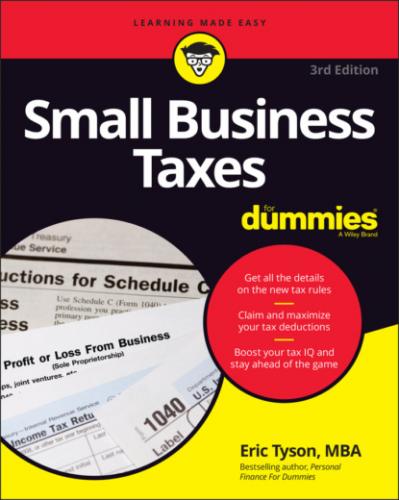Nothing really forces you to plan ahead regarding your tax situation and small business. That’s why the vast majority of small-business owners don’t take steps year-round to plan and reduce their taxes. However, tax planning all year is valuable because it enables you to stay on top of your tax and business financial situation and minimize the taxes you legally owe. In this section, I explain typical ways in which taxes enter small-business decisions and some common tax mistakes folks make in this realm.
Factoring taxes into small business decisions
The following list shows some of the ways that tax issues are involved in making sound financial decisions throughout the year.
Type of business and benefits offered: The type of business entity you select for your business — sole proprietorship, limited liability company (LLC), S corporation, and so on — can have significant tax and other consequences. The benefits you’re able to utilize and offer to your employees, if you have them, also have tax ramifications (see Chapter 2).
Retirement accounts: Taking advantage of retirement accounts can mean tens, perhaps even hundreds, of thousands more dollars in your pocket come retirement time. Offering retirement account access to your employees can also be a valuable employee benefit for recruiting and retaining good employees if they understand what they have. Refer to Chapter 3 for more on retirement accounts.
Spending: Throughout this book, I discuss myriad spending decisions you may face in your small business, such as buying equipment (Chapter 8), spending on employee benefits (Chapter 2), and so on. These decisions will often affect your taxes both now and in the future.
Protecting your assets: Some of your insurance decisions also affect the taxes you pay. You’d think that after a lifetime of tax payments, your heirs would be left alone when you pass on to the great beyond — but that’s wishful thinking. Estate planning can reduce the taxes that are siphoned off from your estate. See Chapter 5 to find out more about estate planning.
Tracking your business financials: Throughout the year, you should stay on top of your business’s income and expenses so that you can see your business’s financial health and record the numbers you need come tax time. Chapter 6 covers these important issues.
Checking out common tax mistakes
Even if some parts of the tax system are hopelessly and unreasonably complicated, there’s no reason why you can’t learn from the mistakes of others to save yourself some money, no matter the time of year. With this goal in mind, this section details common tax blunders that people make when it comes to managing their money.
Seeking advice after an important decision
Too many people seek out information and hire help after making a decision, even though seeking preventive help ahead of time generally is wiser and more financially beneficial.
Failing to withhold or submit enough taxes
If you’re self-employed (or earn significant taxable income from investments outside retirement accounts), you need to make estimated quarterly tax payments. You also need to withhold taxes for your employees and send those taxes along to the appropriate tax agencies. Some small-business owners don’t have a human resources department to withhold taxes and dig themselves into a perpetual tax hole by failing to submit estimated quarterly tax payments.
To make quarterly tax payments, complete IRS Form 1040-ES, “Estimated Tax for Individuals.” This form (discussed in Chapter 10) and its accompanying instructions (and payment coupons) explain how to calculate quarterly tax payments. You can submit payments by mail or electronically through creating/using an online account on the IRS website (https://www.irs.gov/). For more information on the requirement for employee tax withholding, see Chapter 6.
Missing legal deductions
Forsaking retirement accounts
All the tax deductions and tax deferrals that come with accounts such as 401(k)s, SEP-IRA plans, and individual retirement accounts (IRAs) were put in the tax code to encourage you to save for retirement. That’s something that you as a small-business owner should be doing for yourself as well as encouraging your employees to do.
Most excuses for missing out on these accounts just don’t make good financial sense. Some folks underfund retirement accounts because they spend too much and because retirement seems so far away. Others mistakenly believe that retirement account money is totally inaccessible until they’re old enough to qualify for senior discounts. (See Chapter 3 to find out all about your small-business retirement account options.)
Not owning real estate
In the long run, owning a home should cost you less than renting. And because mortgage interest (on up to $750,000 of mortgage debt) and property taxes (up to $10,000 when combined with your state income tax payments) are deductible, the government, in effect, subsidizes the cost of homeownership. (Stay tuned as the state and local tax limit — aka SALT — may be increased higher than $10,000 in 2022.)
If
